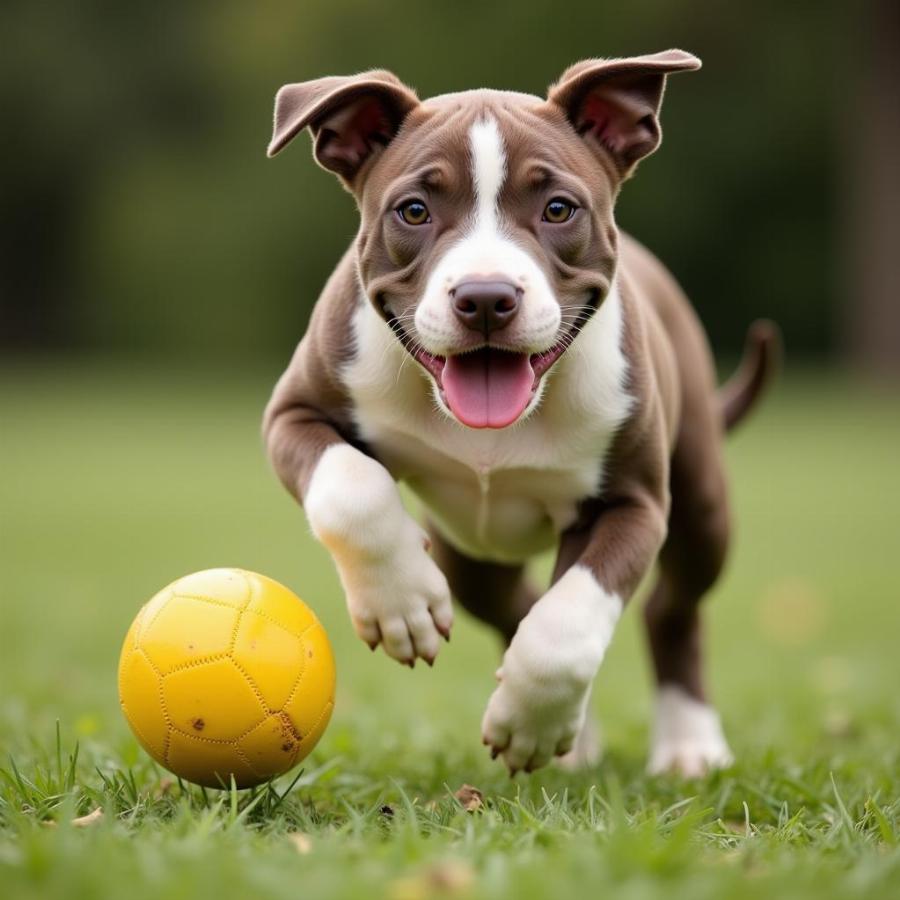Choosing the right food for your puppy pitbull is crucial for their growth, development, and overall well-being. As a devoted pitbull parent, you want to ensure your furry companion receives the optimal nutrition they need to thrive. This comprehensive guide delves into the specifics of dog food for puppy pitbulls, equipping you with the knowledge to make informed decisions for your beloved pet.
Understanding the Nutritional Needs of Puppy Pitbulls
Pitbulls, known for their muscular build and high energy levels, have specific dietary requirements, especially during puppyhood. Here’s what to keep in mind:
-
Protein Powerhouse: Your puppy pitbull needs a diet rich in high-quality protein to support muscle growth and development. Look for food with real meat, like chicken, beef, or fish, as the primary ingredient.
-
Fat for Fuel: Don’t shy away from healthy fats! They provide your pitbull puppy with sustained energy and aid in the absorption of essential vitamins.
-
Carbohydrates for Energy: While protein and fat take center stage, carbohydrates offer a readily available energy source for your active pup. Opt for complex carbohydrates found in brown rice or sweet potatoes.
-
Vitamins and Minerals for Growth: A balanced blend of vitamins and minerals is essential for your puppy’s bone development, immune system, and overall health.
Choosing the Right Type of Dog Food
Navigating the world of puppy food can feel overwhelming. Here’s a breakdown of popular options:
-
Dry Kibble: Convenient and often more affordable, kibble offers a complete and balanced diet. Look for brands specifically formulated for large-breed puppies, ensuring smaller kibble size for easier consumption.
-
Wet Food: Many puppies find wet food more palatable than kibble. It can be a great option for picky eaters or those needing extra hydration. However, it’s generally less cost-effective than dry food.
-
Raw Food: Raw diets have gained popularity, focusing on unprocessed ingredients like meat, bones, and vegetables. While proponents tout the benefits, consulting your vet before switching to a raw diet is crucial, as it requires careful planning and preparation.
-
Homemade Food: For those who prefer complete control over ingredients, homemade diets can be an option. However, it’s vital to work with a veterinary nutritionist to create a balanced recipe that meets all of your puppy’s nutritional requirements.
Feeding Schedule and Portion Control
Establishing a consistent feeding schedule is key:
-
Frequent Feedings: Puppy pitbulls have smaller stomachs and higher metabolisms than adult dogs. Aim for 3-4 smaller meals per day until they reach six months of age.
-
Portion Control: Refer to the feeding guide on your chosen dog food bag as a starting point, and adjust based on your puppy’s individual needs and activity level.
-
Freshwater Always: Ensure your puppy pitbull has access to fresh, clean water at all times.
Common Mistakes to Avoid
-
Overfeeding: While those puppy-dog eyes can be persuasive, overfeeding can lead to obesity and health issues later in life.
-
Table Scraps: Resist the temptation to share your meals with your pitbull puppy. Human food can be harmful to dogs, leading to digestive upset or even toxicity.
-
Sudden Diet Changes: Abruptly switching your puppy’s food can upset their stomach. Introduce new food gradually, mixing it with their previous food over a week.
 Active Pitbull Puppy Playing Fetch
Active Pitbull Puppy Playing Fetch
Signs of a Healthy Diet
A well-nourished puppy pitbull will exhibit:
-
Healthy Weight: You should be able to feel their ribs with slight pressure, but they shouldn’t be overly visible.
-
Shiny Coat: A healthy coat is a good indicator of proper nutrition.
-
Regular Bowel Movements: Their stool should be firm and consistent.
-
High Energy Levels: A well-fed puppy will be playful and alert.
Consulting Your Veterinarian
Remember, your veterinarian is your best resource for tailored advice. They can assess your pitbull female dog or colby pitbull dog and recommend the best dog food for puppy pitbulls.
FAQs About Dog Food for Puppy Pitbulls
Q: Can I give my puppy pitbull adult dog food?
A: No. Adult dog food lacks the necessary nutrients for growing puppies. It’s crucial to choose puppy-specific food formulated for their developmental needs.
Q: When can I switch my puppy pitbull to adult food?
A: Most pitbulls can transition to adult food around 12-18 months of age. However, it’s best to consult your veterinarian for personalized guidance.
Q: What are some good sources of protein for puppy pitbulls?
A: Look for food with high-quality protein sources like chicken, beef, fish, lamb, or eggs listed as the first ingredient.
Q: What should I do if my puppy pitbull is a picky eater?
A: Try different flavors or textures of puppy food, or consider adding warm water or a small amount of wet food to their kibble to enhance palatability.
Q: How can I tell if my puppy pitbull has a food allergy?
A: Food allergies can manifest as digestive issues, skin problems, or ear infections. If you suspect a food allergy, consult your veterinarian. They may recommend an elimination diet to pinpoint the culprit.
Finding the Perfect Food for Your Furry Friend
Choosing the right dog food for your puppy pitbull is a journey, not a race. With careful research, consideration of their individual needs, and guidance from your veterinarian, you can provide your beloved companion with the nourishment they need to grow into a happy and healthy adult.
Don’t forget to check out our other informative articles on Beaut Dogs, where we cover a wide range of topics, from zignature dog food reviews to insights on the fascinating pitbull and cattle dog mix.
About Beaut Dogs
Beaut Dogs is your one-stop resource for all things dog-related. We are passionate about providing dog lovers with accurate, helpful, and engaging information to help you provide the best possible care for your canine companion. For personalized support and answers to your dog-related questions, contact us at [email protected].